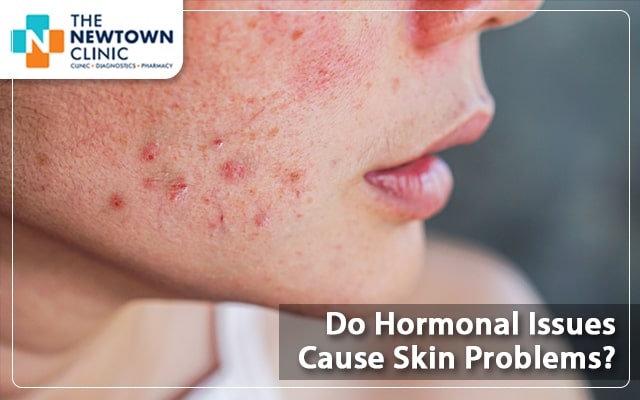Introduction
Hormones are chemicals that help coordinate your body’s functions, like emotions, mood, sexual function, metabolism, growth and many more. Hormones are therefore necessary for the normal functioning of your body. However, suppose the levels rise or are lower than usual. In that case, it can cause several issues, including skin problems, says the best skin specialist in Newtown Clinic.
Hormones and Acne
Acne is a common skin problem, caused by hormonal imbalance. It is caused when hair follicles in your face get blocked with oil and dead skin cells. The material trapped in the follicles can attract bacteria, causing inflammation and the development of spots.
Hormonal imbalance increases the chances of developing acne as they impact the amount of oil that our skin produces. An increase in the amount of oil produced raises the chances of your facial follicles getting blocked.
The primary hormone that affects acne is testosterone. Higher testosterone levels stimulate the production of oil, leading to a higher risk of acne. According to skin specialists in Kolkata, this is the reason why young boys tend to develop acne and other skin problems in their adolescence.
Testosterone is present in both men and women. However, contrary to men, the impact of testosterone in women is milder as it gets balanced against the effects of estrogen. This hormonal balance, however, topples towards the end of the menstrual cycle as estrogen levels drop. Thus, the results of testosterone on the skin become apparent. It is common for many women to start developing spots in the days before their period arrives.
How Menopause Affects Your Skin?
As women pass through menopause, the changes in hormone levels during this period can trigger specific skin problems, says a skin doctor in Salt Lake.
Estrogen stimulates collagen and oil production in women’s skin, thus, giving them a youthful and plump look. During menopause, however, the estrogen level drops, causing a woman’s skin to become dry and itchy.
What can you do?
As most skin problems after menopause are mainly caused due to hormonal imbalance, the symptoms can be reduced through hormone replacement therapy (HRT). However, you should first consult your doctor, as HRT is not suitable for everyone.
Other options include changing your skincare routine. According to a dermatologist in Salt Lake, the best thing that you can do to look after your skin during menopause is to use more moisturizer to hydrate your skin. You can also follow a balanced diet and exercise regularly to improve the condition of your skin.
Suppose you are experiencing any persistent skin problems like acne, dry skin or itchiness. In that case, you can consult a skin specialist.
Visit the best skin specialist in Newtown Clinic, and get effective skin treatment.

